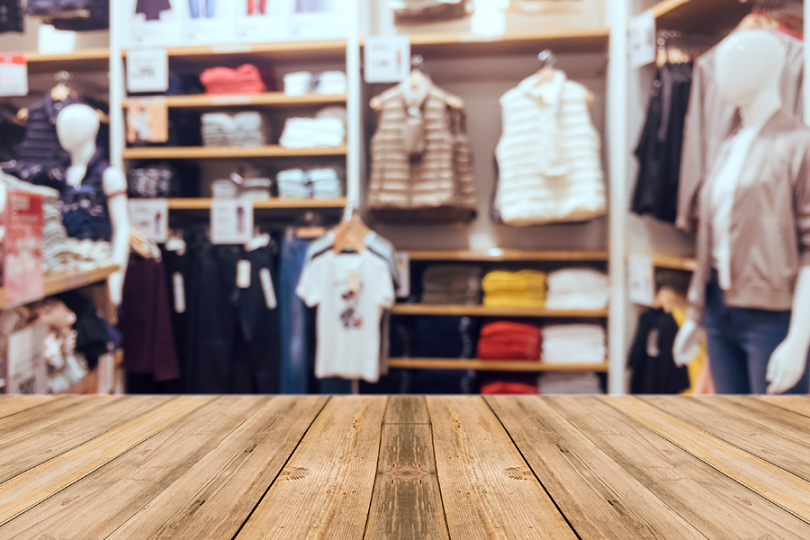It might be the last thing on your mind when you are setting up your new business, but your choice in flooring is an important investment that cannot simply be ignored. It is something that you and every customer will notice, and can show off your goods or alternatively undermine your brand image and day-to-day business.
When considering the right floor covering for your commercial space, the first thing to consider is the usage.Different commercial spaces have different functional requirements for the flooring options that they can support. In the commercial sector, cost and durability are often the main factors. Style and design also play an important role during the decision making process.
The flooring of a retail space depend largely on the type of goods that you will be selling. For example, if your store sells high-end apparel, you need to ensure that the floor’s quality and design reflects this.
High quality carpet could be a good choice for such retail environment. On the contrary, retail shops with high foot traffic volumes may consider wood or laminate floors, because they are easier to maintain, and may not show wear and tear to the same degree.
Below are a few quick tips for choosing flooring for a retail store:
- In large commercial or industrial stores, sturdy vinyl flooring, tiles and wooden floors are good choices. They are waterproof, abrasion resistant and easy to clean. It can guarantee that the floor is durable and will not be easily damaged by strong foot traffic.
- In a more upscale boutique environment, elegant wood flooring or luxurious carpets contribute to the glamorous experience that your customers expect. Attract more potential customers through your store’s beautiful appearance.
- In smaller spaces that host smaller volumes of clients, your options are more diverse. Keep in mind that sound can be an important factor in the environment, especially in smaller spaces. So, choose a carpet to keep it quiet and intimate, or a hard surface that makes the space feel bigger. Quick step majestic floors can be an excellent choice here.
Next, we will introduce the advantages and disadvantages of several flooring options that are commonly used in retail spaces.
Laminate
Laminate is a cheaper alternative to hardwood, stone or tile flooring. It is extremely durable and easy to clean and maintain. Laminate floors can be used in a variety of environments, including high traffic offices, kitchens, waiting rooms and corridors.
The advantages are obvious. First, it provides a cheaper alternative to approximate the aesthetic appeal of hardwood, stone or tile flooring, and it is extremely durable, scratch and water resistant. Second, the installation is simple and quick, and it feels and softer and warmer than hard floors on the foot. Moreover, Laminate can be easily cleaned and maintained. One of the most popular laminate floors for retail shops is the quick step impressive ultra collection.
The disadvantage is that it can’t be repaired like hardwood, it needs to be replaced, and the waterproof effect is limited.
Secondly, due to the repeatability of the pattern, if not properly installed, it is possible to place two identical boards adjacent to each other. Furthermore, Laminate does not absorb sound. Merchants with higher requirements for sound insulation need to consider alternative options.
Carpet Tiles
Carpet tiles are becoming more and more popular in office buildings. Moreover, carpet tiles can offer new, modern and innovative designs. Typically, carpet tiles are used in office environments, schools, or waiting rooms.
The main feature of carpet tiles is the ability to provide sound insulation, while also withstanding high volumes of foot traffic. In terms of price, it doesn’t hit too hard. However, compared to other floors, carpet tiles are easy to soil and more challenging to clean than wood and laminate, so more maintenance is required.
Vinyl Composite Tile (VCT)
Like carpet tiles, VCT has become increasingly popular as a cost-effective flooring option for commercial buildings. Vinyl composite tiles are commonly used in hospitals, medical centres, offices, retail spaces and commercial outlets.
It has the advantage of being able to withstand high foot traffic flow rates, is extremely durable, is easy to clean, is elastic to scratches and damage, and is available in a variety of colors and designs.
The disadvantage is that many people associate it with cold and sterile spaces, i.e. the hospital; since the floor surface often needs to be stripped and re-applied, the maintenance requirements are high, and if not taken care of, the maintenance costs may exceed the initial cost. It is also not as durable as vinyl.
Natural hardwood flooring
Natural hardwood flooring is considered by many to be the most beautiful type of flooring available, so it is still the choice of many premium office spaces. It gives a classic and timeless look that enhances the feel of any office interior. Natural hard floors are suitable for almost any environment, including offices, kitchens, retail spaces and design spaces. It all depends on how much you are willing to spend.
Its biggest advantage is its beautiful appearance. It is durable, but also easy to clean and maintain. In addition, you can select a traditional or a modern style, whichever suits your business best.
The biggest determining factor may be that it is very pricey. Plus when it comes to maintenance, depending on the degree of damage (scratches and flaws), it is necessary to repair twice a year. In terms of sound, natural hard floors do not provide any sound insulation or acoustics to assist the space. Hardwood, especially when walking, is noisy and is not suitable for spaces that require quiet.
Vinyl plank flooring
The waterproof and durable features of vinyl plank flooring have cemented them as the floor of choice for many customers. The installation process is simple, and the price is very favourable. It is for a variety of business environments, including offices, retail spaces, kitchens, etc.
The main features of vinyl plank flooring are its water-proofing and durability. In the case of high traffic flow, the wear resistance coefficient is relatively high, reducing the situation of repeated replacement of the floor. Second, the installation and maintenance of vinyl plank flooring is simple. Regular cleaning and mopping will keep it well maintained For the business environment, especially one with a large flow of people, simple cleaning methods can reduce a lot of manpower and material consumption and reduce costs.
Furthermore, vinyl plank flooring is designed to give a more comfortable and softer feel than the wooden floors and tiles and does not feel cool from the floor. Compared to laminates, vinyl plank flooring has a noise-reducing effect and better acoustic performance. Let the user feel the enjoyment from the floor.
The main disadvantage is that the base floor is relatively high. The vinyl plank is a softer material than other floor materials, so the vinyl plank flooring is relatively thin and soft. Even small protrusions can cause agglomerated wear materials, causing problems with accelerated wear. So, vinyl plank flooring needs a perfectly smooth and flat subfloor, which is where he differs from other floors. Similarly, due to the very thin and soft nature of vinyl plank flooring, it is very easy to be pierced by sharp objects, or heavy objects, and it is difficult to repair once damage occurs.
In general, each type of flooring material has its own characteristics. When choosing, the business owner needs to choose the floor that best meets their budget and design requirements, the flooring choice needs to be practical and easy to maintain for retail space.
“The opinions expressed by BizWitty Contributors are their own, not those of BizCover and should not be relied upon in place of appropriate professional advice. Please read our full disclaimer."







